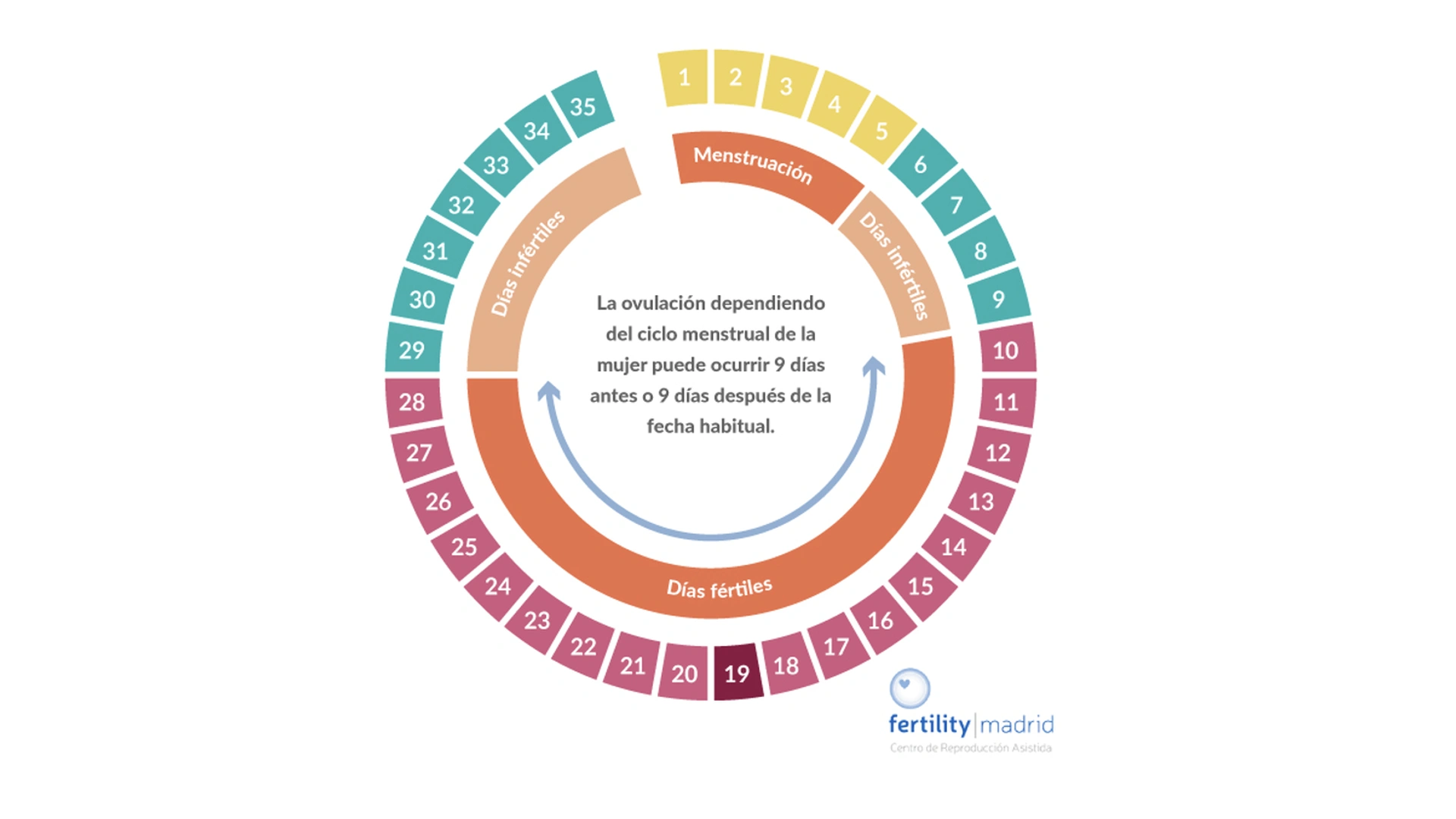

The menstrual cycle is the period between the first day of one period and the first day of the next. Irregular menstrual cycles can cause many doubts and concerns, especially if you want to get pregnant. In this guide from Fertility Madrid, we explain whether it is possible to get pregnant with an irregular cycle, how to identify your fertile days and what strategies can help you increase your chances.
What is an irregular menstrual cycle and how does it affect fertility?
An irregular menstrual cycle is one in which the interval between periods varies significantly. Although a regular cycle usually lasts between 21 and 35 days, women with irregular cycles may have shorter or longer periods, or even months without menstruation (amenorrhoea).
Irregular cycles can make it difficult to predict ovulation, but they do not mean that you cannot get pregnant. The key is to understand your body and seek specialised medical advice.
Can I get pregnant if I am irregular?
Yes. Many women with irregular periods become pregnant naturally. However, it can be more difficult to know when you are ovulating, which reduces the accuracy of planning sexual intercourse.
Having an irregular cycle is not synonymous with infertility, but it may require more attention and personalised strategies.
How many days late is normal if I have an irregular cycle?
It depends on each case. If your cycle varies constantly, it is normal to have delays of several days. However, if you go more than 35-40 days without menstruating, you should take a pregnancy test or consult your gynaecologist.
In women with irregular cycles, delays do not always indicate pregnancy. They could be due to:
- Stress or hormonal changes.
- Disorders such as PCOS or thyroid problems.
- Late ovulation.
How can I identify my fertile days with irregular cycles?
Although it is more complicated, it is possible to detect your fertile days if you are irregular. These strategies can help:
Observation of cervical mucus: if it becomes more elastic and transparent, like egg white, you are in your fertile phase.
Ovulation tests: these detect the increase in the hormone LH before ovulation. They are very useful, although they can give false positives if there is a hormonal imbalance.
Basal body temperature: recording your body temperature every morning helps to detect ovulation retrospectively.
For these women, concentrating sexual intercourse around their fertile days will help them to achieve pregnancy.
Irregular 35-day menstrual cycle

In women with irregular cycles, every 25-35 days, predicting ovulation is more difficult, as it can occur at any time, beyond the patient's control.
Fortunately, there are several strategies you can follow to increase your chances of becoming pregnant, even with irregular cycles.
Here are some tips for getting pregnant if you have irregular cycles:
What can I do to improve my chances of getting pregnant if my cycle is irregular?
For women with irregular cycles we recommend the following:
- Have sexual intercourse every 2–3 days. This increases the likelihood of an egg and sperm meeting, and therefore of natural conception.
- Use ovulation tests. These are urine test strips that detect the rise of the luteinising hormone (LH). This hormone is produced from the beginning of the cycle and reaches its highest levels about 24–36 hours before ovulation. Once the test shows positive, couples can concentrate intercourse on those days. It is important to use these tests with caution: in some cases they may give false positives or false negatives, which can be misleading.
- Seek specialist help if cycles are very irregular. In women whose cycles are extremely irregular (lasting more than 40–60 days without menstruation, known as amenorrhoea), predicting ovulation is almost impossible. In some cases ovulation may not happen at all (anovulatory cycle). These women may require the support of a gynaecologist or even assisted reproduction treatments in order to achieve pregnancy.
Which methods can help calculate ovulation if my cycles are irregular?
If you are looking for a practical way to guide yourself, you can use a fertile days calculator based on your previous cycles. However, with irregular cycles, ovulation may occur earlier or later than expected, so it is important to keep in mind:
- Have sexual intercourse every 2–3 days to increase your chances of conception, regardless of the exact day of ovulation.
- If your cycles last longer than 40 days, or if there are months without menstruation, you may not be ovulating at all (this is known as an anovulatory cycle).
In these cases, the best option is to consult a fertility specialist, who can carry out tests to check whether ovulation is taking place and recommend the most suitable treatment if needed.
What should I do if my cycles are very long or I have amenorrhoea?
A prolonged absence of menstruation can make it difficult to conceive naturally. Some common causes of amenorrhoea or anovulation include:
- Polycystic ovary syndrome (PCOS)
- Thyroid disorders
- Underweight or excessive exercise
- Chronic stress
In these cases, it may be necessary to:
- Begin ovarian stimulation treatment.
- Conduct a comprehensive fertility assessment.
- Assess assisted reproduction treatments such as artificial insemination or in vitro fertilisation.
How can I tell if I am pregnant if my periods are irregular and I have no symptoms?
If your cycles are irregular and you do not notice any physical changes, you could be pregnant without knowing it. In these cases:
-
Take a urine pregnancy test if you have had sexual intercourse and your period is late by 35-40 days.
-
If in doubt, take a blood pregnancy test (beta hCG) for greater accuracy.
Not all women have clear symptoms at first. Confirm as soon as possible to receive appropriate follow-up care.
When should you see a fertility specialist?
It is recommended that you seek medical advice if:
- You have been trying to get pregnant for more than 12 months (or 6 months if you are over 35 years old).
- Your cycles exceed 40 days or there are months without menstruation.
- You have symptoms of hormonal imbalances (acne, excess hair, weight gain, etc.).
At Fertility Madrid, we can help you with a personalised assessment and suggest the best options for achieving pregnancy.
Treatments available at Fertility Madrid
Depending on your situation, we may recommend:
- Stimulate ovulation in a controlled manner.
- Artificial insemination on fertile days.
- In vitro fertilisation (IVF) if there are other factors affecting fertility.
We support you with a specialised medical team and state-of-the-art technology.
Frequently asked questions about pregnancy and irregular cycles
Can I get pregnant if I have irregular periods?
Yes. Although it is more difficult to predict ovulation, many women achieve pregnancy with medical help or by becoming more familiar with their cycle.
How many days of delay can be considered normal in women with irregular periods?
A delay of up to 7–10 days is normal. If it exceeds 35–40 days, it is advisable to take a pregnancy test.
Are there treatments to regulate the menstrual cycle?
Yes, depending on the cause. It may include lifestyle changes, hormone treatments, or assisted reproduction.
Do You Have Any Questions or Need More Information?
At Fertility Madrid, our specialists are here to guide you and answer any doubts about irregular cycles, ovulation, and fertility treatments. Do not hesitate to contact us – our consultations are warm, supportive, and without obligation.

Óscar Oviedo
Director Médico




